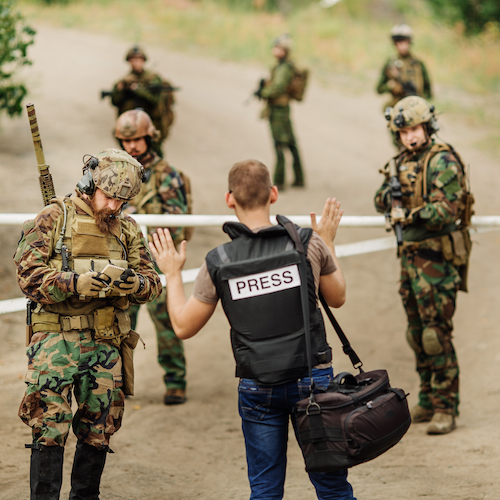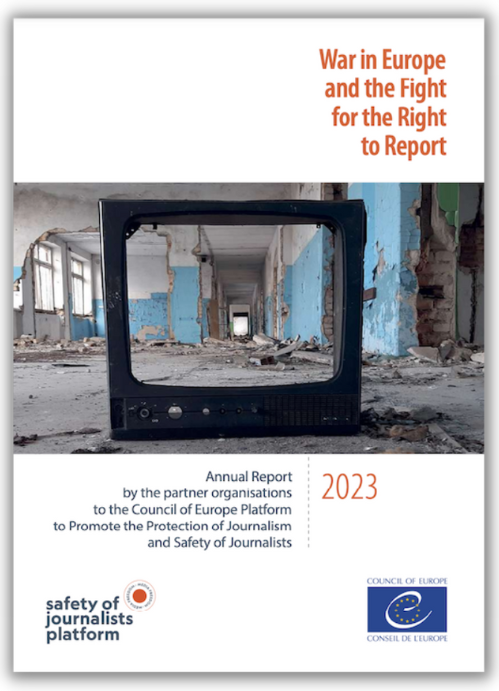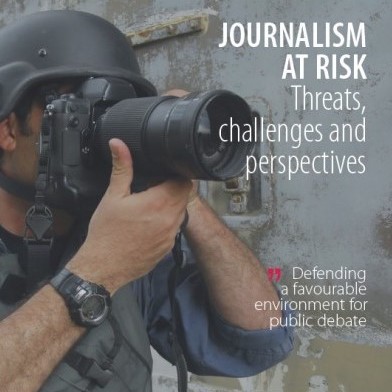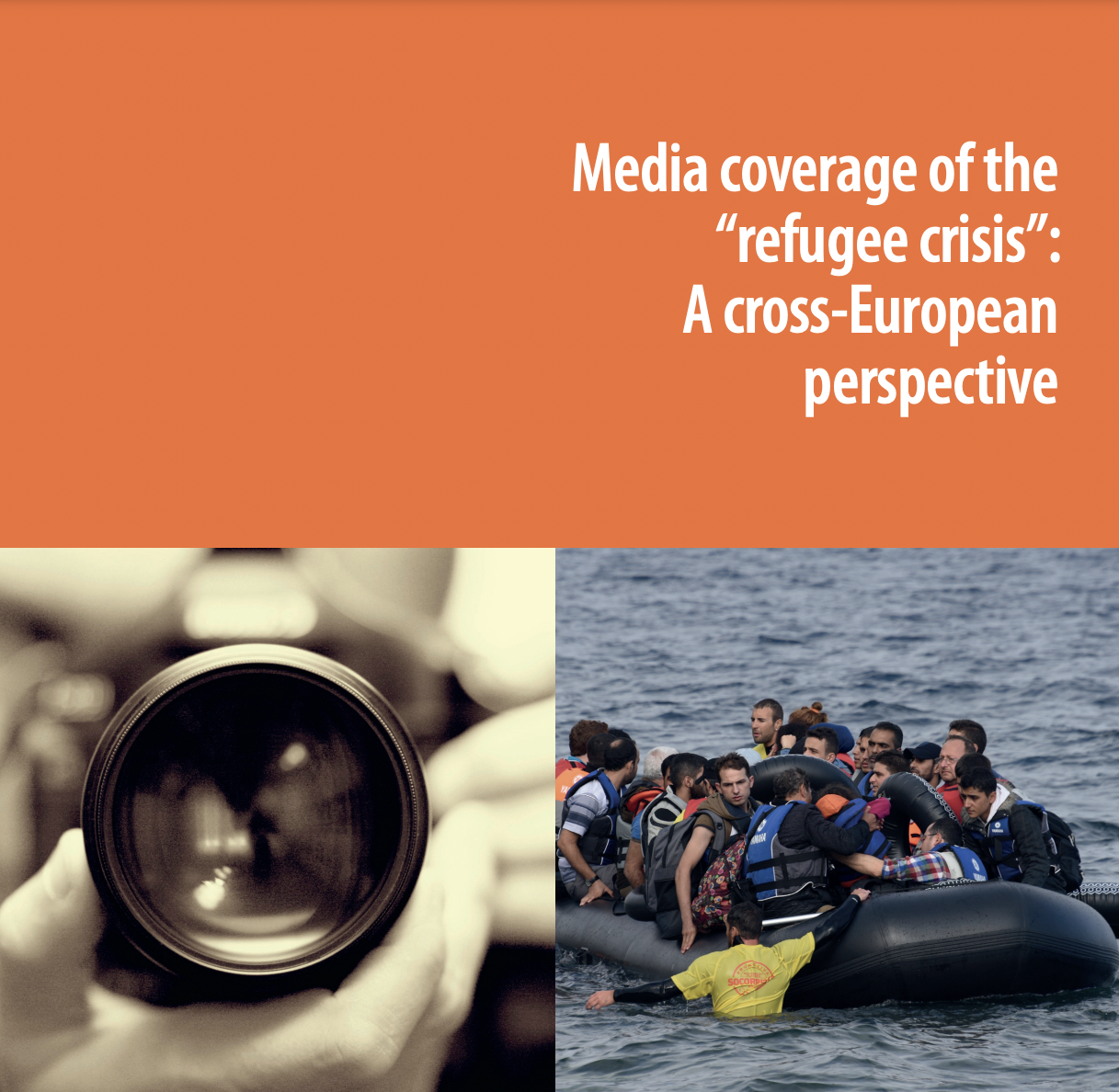Freedom of expression in times of conflict

The right to freedom of expression and information constitutes one of the essential foundations of democratic society. In conflict situations and wars, the role of the media is critical in providing the public with accurate and timely information. Trustworthy news and images can contribute to the protection of civilians and conflict prevention, bring to the attention of the international community the horrors and reality of conflict and expose violations of human rights and international humanitarian law.
As a consequence, the work of journalists in conflict zones is fraught with dangers: denial of access, censorship, harassment, arbitrary detention and attacks are alarmingly frequent. As others who decide to work in conflict areas, journalists take consciously a special risk by working there. However, they are considered civilians and, as such, should not be targeted. Member states should recognise the crucial importance and role of journalism and the media – and ultimately individual journalists – in times of conflict and aggression. Safety of journalists in conflict areas is instrumental to that end.
Conflict situations are also often a fertile soil for mass disinformation campaigns intended to undermine the proper understanding of the developments, as well more generally, security, public order and peaceful democratic processes. There is a vital need to develop tools to more effectively protect democracy from “information weapons”, while preserving freedom of expression and freedom of the media both in the countries involved in the conflict and more widely.

Recommendation CM/Rec(1996) 4 on the protection of journalists in situations of conflict and tension
Specifically addressing the situations of conflict and tension, focusing on the protection of the physical safety of journalists, rights and working conditions of journalists and investigation of instances of attacks on the physical safety of journalists. The Recommendation provides, among others, that accreditation systems should only be introduced to the extent necessary in particular situations, subject to a number of conditions.
This document provides guidance to Member States on how to ensure to the maximum of their ability the safety of media professionals in times of crises while also guaranteeing their freedom of movement and access to information. Military and civilian agencies managing crisis situations should take practical steps to promote communication with media professionals, including through briefings, press conferences and press tours. They should do so on an equal basis and without discrimination. The guidelines call on member States to protect journalists’ sources of information and material, to provide guarantees against the misuse of defamation legislation and undue limitations on freedom of expression and information and warns against the manipulation of public opinion. The guidelines also address media professionals and their employers on their special responsibilities in times of crises, the former in terms of adherence to the highest professional and ethical standards, and the latter in terms of provision of training, safety equipment and insurance. The guidelines further stress the need to strive for dialogue and cooperation between governments, the media, national and international governmental and non-governmental organisations to ensure the protection of freedom of expression and information in times of crisis.
The Committee of Ministers solemnly reaffirms that all journalists working in situations of conflict and tension are, without qualification, entitled to the full protection offered by applicable international humanitarian law, the European Convention on Human Rights and other international human rights instruments.
The Committee of Ministers considers in this context that, in urgent cases, the Secretary General could take speedily all appropriate action on receipt of reports on infringements of rights and freedoms of journalists in member states in situations of conflict and tension and calls on the member states to co-operate with the Secretary General in this regard.
Many provisions are largely relevant and to be considered applicable in both conflict and non- conflict situations.
Protection
Paragraph 14: Member States should take into account the specific nature and democratic value of the role played by journalists and other media actors in particular contexts, such as in times of crisis, during election periods, at public demonstrations and in conflict zones. In these contexts in particular, it is important for law enforcement authorities to respect the role of journalists and other media actors covering demonstrations and other events. Press or union cards, relevant accreditation and journalistic insignia should be accepted by State authorities as journalistic credentials, and where it is not possible for journalists or other media actors to produce professional documentation, every possible effort should be made by State authorities to ascertain their status. Dialogue between State authorities and journalists’ organisations is moreover encouraged in order to avoid friction or clashes between police and members of the media.
Paragraph 16: Member States should encourage media organisations, while not encroaching on their editorial or operational autonomy, to fulfil their institutional responsibilities towards all journalists and other media actors working for them – in salaried, freelance and all other capacities. This may include the adoption of in-house guidelines and procedures for the deployment of journalists and other media actors on difficult or dangerous assignments, for instance in conflict zones. Such deployment should be voluntary and informed. Institutional responsibilities also include providing journalists and other media actors with adequate information, including on the risks involved, and requisite training in all matters of safety, digital security and privacy, as well as arranging for life assurance and health and travel insurance as part of a comprehensive and equitable package of work conditions. These institutional responsibilities additionally include, as relevant, the provision of legal support and representation and trauma counselling on return from assignments.
Safety, security, protection
Paragraph 26: The State should not unduly restrict the free movement of journalists and other media actors, including cross-border movement and access to particular areas, conflict zones, sites and forums, as appropriate, because such mobility and access is important for news and information-gathering purposes.
Paragraph 27: The effectiveness of a system of protection may be influenced by contextual factors, such as in crisis or conflict situations, where there are heightened risks for the safety and independence of journalists and other media actors, and where State authorities may experience difficulties in exerting de facto control over the territory. Nevertheless, the relevant State obligations apply mutatis mutandis in such specific contexts, which are at all times subject to international human rights law and international humanitarian law.
The Assembly notes with concern that, today, States are more and more often confronted with the phenomenon of “hybrid war”, which poses a new type of threat consisting of a combination of military and non-military techniques such as cyberattacks; mass disinformation campaigns, including fake news, in particular via social media; interference in election processes; disruption of communications and other networks; and many others.
The Assembly also expresses deep concern regarding numerous cases of mass disinformation campaigns intended to undermine security, public order and peaceful democratic processes. There is a vital need to develop tools to protect democracy from “information weapons”, while preserving freedom of expression and freedom of the media in the country under attack.
The Assembly recalls that when countering hybrid war, States are bound to respect human rights law.
The Assembly recommends that the Committee of Ministers conduct a study on hybrid war threats, with a special focus on non-military means; step up co-operation with other international organisations working in this field, in particular the European Union and the North Atlantic Treaty Organization (NATO); promote the ratification by member and non-member States of the Convention on Cybercrime (ETS No. 185).
The right to freedom of expression and information constitutes one of the essential foundations of democratic society. In conflict situations and wars, human rights and international humanitarian law are often violated. It is thus indispensable that the public receive information about such conflicts and wars. As others who decide to work in conflict areas, journalists take consciously a special risk by working there. They do so in order to provide news and comment about such conflicts and thus serve the public.
dismantled the complexity of the phenomenon by looking into its constituent elements, its mechanism and main patterns. The report offers a set of recommendations on addressing disinformation, and among them – a recommendation that technology companies should build fact-checking and verification tools.
is of immediate relevance and also contains some provisions regarding the use of flagging and other techniques related to fact-checking.
Under the authority of the Committee of Ministers, and of the Steering Committee on Media and Information Society (CDMSI), the MSI-INF is instructed to draft a Guidance Note on countering the spread of online mis- and disinformation through fact-checking and platform design solutions in a human rights compliant manner by the end of 2023.
- Ukraine: CoE platform partners demand protection of journalist safety - Joint statement condemns Russian Federation's efforts to restrict independent reporting
- New reactions by media regulatory authorities to the crisis is Ukraine: NRAs communicate the EU regulation and decision to ban RT and Sputnik to stakeholders, some extend ban further
- EPRA: Situation in Ukraine prompts reactions from NRAs across Europe
- International Code of Practice for the Safe Conduct of Journalism (International Federation of Journalists)
- Code of Practice on Disinformation
- ERGA Report on disinformation: Assessment of the implementation of the Code of Practice on Disinformation
- European Observatory of Online Hate
- Harmful Information – Misinformation, disinformation and hate speech in armed conflict and other situations of violence: ICRC initial findings and perspectives on adapting protection approaches
Technical assistance and cooperation actions in time of war and conflict
Responsibilities of member states
Guarantee of safety
In conflict situations, member states should comply fully with the obligations applicable to them under international law related to the protection of civilians in armed conflict, including journalists and other media actors (hereinafter “journalists”). Member states should assure to the maximum possible extent the safety of both national and foreign journalists. They should instruct their military and police forces to give necessary and reasonable protection and assistance to journalists when so requested and treat them as civilians, provided that they take no action adversely affecting their status as civilians. The need to protect journalists should not be used as a pretext to restrict their rights. Member states should take appropriate steps to ensure that the killings and other attacks on journalists are effectively investigated and those responsible brought to justice.
Freedom of movement and access to information
Member states should guarantee freedom of movement and access to information to journalists, including cross-border movement and access to conflict zones. This includes issuing visas and other necessary documents, as well as facilitating the import and export of professional equipment. Member states should not restrict the public’s access to information beyond the limitations allowed by Article 10 of the European Convention on Human Rights.
Provision of information to the media
Military and civilian authorities should provide regular information to journalists and the media – on equal basis and without discrimination – through briefings, press conferences, press tours or other means. If possible, secure information centres with appropriate equipment should be set up for the media.
Protection of journalists’ sources of information and journalistic material
Journalists should not be required to disclose their sources of information or to hand over information and material gathered while covering conflict situations. Any exception to this principle should be in accordance with Article 10 of the European Convention on Human Rights and other relevant Council of Europe standards.1
1 Notably the relevant case law of European Court of Human Rights and Recommendation No. R (2000) 7 of the Committee of Ministers to member states on the right of journalists not to disclose their sources of information.
Guarantees against undue limitations on freedom of expression
Member states should use concrete and clearly defined terms when imposing restrictions of freedom of expression and information in conflict situations, notably regarding incitement to violence and public disorder. Member states should not misuse libel and defamation legislation to limit freedom of expression and should refrain from intimidating journalists by lawsuits or disproportionate sanctions.
Accreditation
Systems for the accreditation of journalists should be introduced only to the extent necessary and should facilitate the exercise of journalism in situations of conflict and tension. If required by national law, accreditation should be given to all media professionals without discrimination according to clear and fast procedures free of administrative obstacles. Furthermore, the exercise of journalism and journalistic freedoms should not be made dependent on accreditation. States should refrain from taking restrictive measures against journalists, such as withdrawal of accreditation or expulsion, on account of the exercise of their professional activities or the content of their reports.
War correspondents / Embedded journalists
Journalists who accompany the armed forces of a State without being members thereof are recognised the status of “war correspondents” or “embedded journalists”. They are civilians and may not be made the object of attack; they are entitled to prisoner-of-war status upon capture.
Derogations under Article 15 of the European Convention on Human Rights
In situations of war or other public emergency threatening the life of the nation, measures derogating from the state's obligation to secure these rights and freedoms are allowed to the extent strictly required by the exigencies of the situation, provided that such measures are not inconsistent with its other obligations under international law and meet the requirements of lawfulness, legitimate aims, necessity and proportionality.
Responsibilities of journalists
Adherence to professional and ethical standards
Journalists need to adhere to the highest professional and ethical standards in order to provide to the public timely, accurate and comprehensive information. Self-regulatory bodies as the most appropriate mechanism for ensuring responsible and professional reporting should continue performing their important role during conflict situations.
Countering the spread of propaganda and disinformation
Journalists should exercise vigilance in covering conflict situations where objective and quality journalism and reporting are key tools in countering propaganda and disinformation.
Responsibilities of media organisations
Deploying journalists to conflict zones
Media organisations should adopt in-house guidelines and procedures for the deployment of both salaried and freelance journalists on difficult or dangerous assignments, such as conflict zones. Such deployment should be voluntary and informed. Journalists should receive adequate information on the risks involved and training in all matters of safety, digital security and privacy.
Adequate working conditions
Media organisations should take appropriate preventive measures contributing to the protection of the physical safety of journalists working in conflict zones. They should adequately prepare dangerous missions in situations of conflict and tension by providing practical information and training to all journalists, whether staff or freelance, widely distributing “survival guides” and advisories as well as information on the availability of appropriate protection equipment. Media organisations should provide life insurance as well as health and travel insurance to the journalists deployed to conflict zones. Their institutional responsibilities additionally include, as relevant, the provision of legal support and representation and trauma counselling on return from assignments.
Responsibilities of civil society
Safety training
Journalism schools and professional associations are encouraged to provide as appropriate general and specialised safety training for media professionals.
Insurance for freelance journalists
International organisations of journalists are encouraged to facilitate the establishment of an insurance system for freelance media professionals covering conflict situations.
Support action to Ukraine
The Russian Federation’s military aggression against Ukraine brought dangers and casualties for media actors and media organisations in Ukraine. These include attacks on journalists, media workers taken to hostage, threats to journalists, shelling by Russian military of media infrastructure, captured radio frequency resources, spread of Russian propaganda.
The priority adjustments to the Council of Europe Action Plan for Ukraine includes measures aiming to enforce to safety of journalists and media, and of access to information in Ukraine.
Measure 1. Support to National TV and Radio Broadcasting Council of Ukraine and National Public Broadcasting Company (UA:PBC) in order to enable their capacities to function under the new circumstances
- Enabling a grant to UA:PBC May 2022
Measure 2. Facilitating Headquartered Hub for Media Support: Safety and Prevention of Information Disorder through information sharing and connecting to the Council of Europe/Platform for Safety of Journalism alerts
Measure 3. Assist the Ukrainian media and journalists’ organisations in informing public on war facilitating their conditions to work for reporting while internally displaced or refugeed
- Complementary / Relevance Measures-AP Moldova: Support to Media Pluralism and Freedom of Expression
- Complementary / Relevance Measures-AP Azerbaijan: Reinforcing Gender Equality and other Ethical Standards in Media
- Complementary / Relevance Measures-AP Georgia: Strengthening Media freedom, Internet governance and Personal Data Protection






